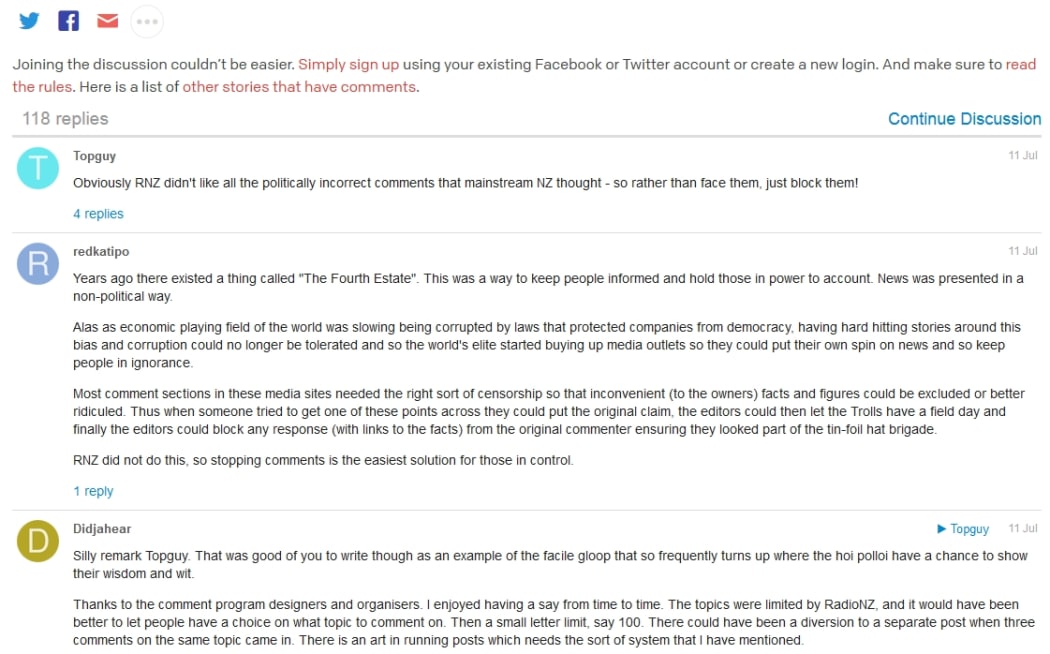RNZ has a new-look website, but you can’t contribute comments to the content any more. Other online media have made the same move lately. Why turn the audience away?

Photo: 123RF
RNZ launched a new website this week, with some new features. But one feature that’s gone is readers' chance to add to it.
About a year after it introduced the service, RNZ announced last week that the new site would no longer allow users to post comments directly on selected stories
“It was an experiment to see whether we could create a space where thoughtful and insightful comments would thrive, but there haven't been many people involved in that conversation," said RNZ’s community engagement editor, Megan Whelan.
She told the National Business Review as few as 25 "hardcore commenters" were taking up the option regularly.
Ironically, her story announcing the move attracted more comments than any other Mediawatch had seen lately on the RNZ site. Predictably, few were in favour of losing the opportunity.
But RNZ’s not the only outlet to turn off comments lately - and turn away those who want to engage in that way on their website.
Cutting out the comments
Local website The Spinoff followed RNZ’s lead, with editor Duncan Greive giving his readers these reasons:
"First, comments make us no money but have a cost. Second, they have been getting vile at times, a trend I see as likely to worsen as we evolve."
Many other outlets have decided it is not worth the hassle of publishing readers’ comments for similar reasons. Big media names like Popular Science, CNN, Reuters, Bloomberg and The Daily Beast have all turned off online comments in the past couple of years, as Ms Whelan pointed out.
But wasn’t that the great leap forward for Web 2.0? That people could feed back into online media rather than just passively consume it?
"We would encourage people to continue to agree or disagree with what we’ve said on Facebook or Twitter – two locations where you’re more likely to be using your own name and identity," Mr Greive told Spinoff readers.
He said some of the best discussion of Spinoff content happened on user-generated comment site Reddit, which "seems to be both self-policing".
Options for expression elsewhere
Ms Whelan said the conversations about RNZ's journalism were now happening on social media platforms like Facebook, Twitter, Instagram and RNZ would be making it easier for people to pass comment there instead.

RNZ's online story announcing the end of readers' comments attracted ... a lot of readers' comments. Photo: screenshot
One frustrated user has set up a Google group called RNZ Talk to host comments about RNZ.co.nz content. So far, only two anonymous identities have posted any comments.
Mediawatch listener Colin Maxwell in Christchurch wasn’t happy about being directed to Facebook, which he called "the massive face-hugging vampire squid of the internet".
"Older New Zealanders have typically not been swayed into widespread adoption of social media," wrote Mr Maxwell.
Ms Whelan told Mediawatch a majority of New Zealanders did use Facebook, and Facebook's own figures have said 2.5 million people in this country use it each month.
"I understand not wanting to be on Facebook or not wanting to click away from the site to make a comment. Every story has an icon so you can email us. There is a contact form on the website. There is no shortage of ways to get in touch."
Who's really engaging who?
Linda Steiner from the University of Maryland in the US is an expert in online community engagement of media outlets.
At the World Journalism Education Congress held at Auckland's AUT this week, she told Mediawatch most modern media outlets seeking readers’ comments were really harvesting the audience, rather than engaging it.
“The New York Times can get 800 comments on a news story within hours, but it’s about building a market. It’s not really about interaction and it's not a community. It’s just random people who are spending time on the pages, and redistributing the site’s news,” she told Mediawatch.
Surely people are engaged if they take the trouble to post a comment?
“I’m in favour of comments but I’m amazed at how fast responses devolve into name-calling, trolling and accusations. These are mostly irrelevant to the actual story,” she said.
If relatively few people are posting comments on RNZ’s site and better discussion is to be found elsewhere online, is that a good reason to stop taking and moderating comments?
“No. You still need to know what people will and won’t respond to. Unless a huge amount of money is required to moderate comments, I’m not sure the fact you don’t get many now is a good reason to turn them off,” said Dr Steiner.
Ms Whelan told Mediawatch that RNZ didn't ask website users consulted for the website's redesign if they wanted to retain the ability to post comments on it.
"Comments were open for more than a year and people just weren't using it. The decision we took came down to where to put scarce resources. I could do more on other platforms where people are having discussions about RNZ journalism," she said.
NBR digital editor Chris Keall said he thought RNZ had made a mistake.
The NBR site carried comments on all stories, and he said readers often posted newsworthy information, tip-offs and debate-worthy perspectives. The NBR also cited an unfinished online survey from Horizon Research, which said 14 percent of 616 people surveyed left comments on news websites.
If the total population was as keen as Horizon’s online panelists, RNZ and The Spinoff would be shunning a potential pool of over 400,000 people who would have engaged with them in that way online.
Is RNZ, at the very least, cutting off a source of news tips?
"Possibly," Ms Whelan said. "But I can only think of two instances where we got those from comments and I forwarded them to reporters. Twice in the past day we have had tips to our Facebook page."

